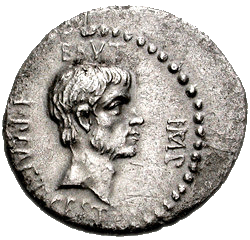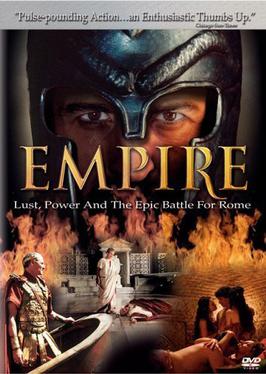
Marcus Antonius, commonly known in English as Mark Antony, was a Roman politician and general who played a critical role in the transformation of the Roman Republic from a constitutional republic into the autocratic Roman Empire.
Year 43 BC was either a common year starting on Sunday, Monday or Tuesday or a leap year starting on Sunday or Monday of the Julian calendar and a common year starting on Monday of the Proleptic Julian calendar. At the time, it was known as the Year of the Consulship of Pansa and Hirtius. The denomination 43 BC for this year has been used since the early medieval period, when the Anno Domini calendar era became the prevalent method in Europe for naming years.

This article concerns the period 49 BC – 40 BC.

Marcus Junius Brutus was a Roman politician, orator, and the most famous of the assassins of Julius Caesar. After being adopted by a relative, he used the name Quintus Servilius Caepio Brutus, which was retained as his legal name. He is often referred to simply as Brutus.

The Second Triumvirate was an extraordinary commission and magistracy created for Mark Antony, Lepidus, and Octavian to give them practically absolute power. It was formally constituted by law on 27 November 43 BC with a term of five years; it was renewed in 37 BC for another five years before expiring in 32 BC. Constituted by the lex Titia, the triumvirs were given broad powers to make or repeal legislation, issue judicial punishments without due process or right of appeal, and appoint all other magistrates. The triumvirs also split the Roman world into three sets of provinces.

Marcus Aemilius Lepidus was a Roman general and statesman who formed the Second Triumvirate alongside Octavian and Mark Antony during the final years of the Roman Republic. Lepidus had previously been a close ally of Julius Caesar. He was also the last pontifex maximus before the Roman Empire, and (presumably) the last interrex and magister equitum to hold military command.

Legio VIII Augusta was one of the oldest legions of the Imperial Roman army.
Aulus Hirtius was consul of the Roman Republic in 43 BC and a writer on military subjects. He was killed during his consulship in battle against Mark Antony at the Battle of Mutina.
Decimus Junius Brutus Albinus was a Roman general and politician of the late republican period and one of the leading instigators of Julius Caesar's assassination. He had previously been an important supporter of Caesar in the Gallic Wars and in the civil war against Pompey. Decimus Brutus is often confused with his distant cousin and fellow conspirator, Marcus Junius Brutus.

Lucius Munatius Plancus was a Roman senator, consul in 42 BC, and censor in 22 BC with Paullus Aemilius Lepidus. He is one of the classic historical examples of men who have managed to survive very dangerous circumstances by constantly shifting their allegiances. Beginning his career under Julius Caesar, he allied with his assassin Decimus Junius Brutus in 44 BC, then with the Second Triumvirate in 43 BC, joining Mark Antony in 40 BC, and deserting him for Octavian in 32 BC. He also founded the cities of Augusta Raurica and Lugdunum. His tomb is still visible at Gaeta.
Quintus Pedius was a Roman politician and general who lived during the late Republic. He served as a military officer under Julius Caesar for most of his career. Serving with Caesar during the civil war, he was elected praetor in 48 BC and was given a triumph for victories over the Pompeians during the civil war's second Spanish campaign.

The Battle of Forum Gallorum was fought on 14 April 43 BC between the forces of Mark Antony and legions loyal to the Roman Senate under the overall command of consul Gaius Pansa, aided by his fellow consul Aulus Hirtius. The untested Caesar Octavian guarded the Senate's camp. The battle occurred on the Via Aemilia near a village in northern Italy, perhaps near modern-day Castelfranco Emilia.
Gaius Vibius Pansa Caetronianus was consul of the Roman Republic in 43 BC. Although supporting Gaius Julius Caesar during the Civil War, he pushed for the restoration of the Republic upon Caesar’s death. He died of injuries sustained at the Battle of Forum Gallorum.

Empire is an American historical television series for ABC. It is an historical drama set in 44 BC Rome, and covers the struggle of a young Octavius, the nephew and heir of Julius Caesar, to become the first emperor of Rome. Octavius is helped in his quest by a fictitious gladiator called Tyrannus.

Quintus Labienus Parthicus was a Roman general in the Late Republic period. The son of Titus Labienus, he made an alliance with Parthia and invaded the Roman provinces in the eastern Mediterranean which were under the control of Mark Antony. He occupied the Roman province of Syria together with the Parthians in 40 BC. He then pushed into southern Anatolia, still with Parthian support. The main Parthian force took charge of Syria and invaded Judea. Both Labienus and the Parthians were defeated by Publius Ventidius Bassus, who recovered these provinces for Mark Antony.
Pontius Aquila was a Roman politician, military commander, and one of the assassins of Julius Caesar. In 45 BC, as tribune of the plebs, he annoyed Caesar by refusing to stand during his triumphal procession, and, in the following year, joined the conspiracy to kill the dictator. Aquila died fighting at the Second Battle of Mutina against Mark Antony in April 43 BC, before the formation of the Second Triumvirate later that year.

The Philippics are a series of 14 speeches composed by Cicero in 44 and 43 BC, condemning Mark Antony. Cicero likened these speeches to those of Demosthenes against Philip II of Macedon; both Demosthenes' and Cicero's speeches became known as Philippics. Cicero's Second Philippic is styled after Demosthenes' On the Crown.
The War of Mutina was a civil war between the Roman Senate and Mark Antony in Northern Italy. It was the first civil war after the assassination of Julius Caesar. The main issue of the war were attempts by the Senate to resist Antony's forceful assumption of the strategically important provinces of Transalpine and Cisalpine Gaul from their governors. The Senate, led by Cicero and the consuls, attempted to woo Julius Caesar's heir to fight against Antony. Octavian, however, would pursue his own agenda.















